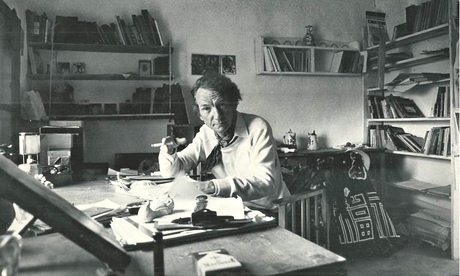
There is a scene in Fellini's La Dolce Vita, the fourth night episode, in which a group of intellectuals sit around reading poetry and looking suitably serious. One of them is an Irish poet, a part played by an actual Irish poet, Desmond O'Grady, who died on Monday.
O'Grady, who was born in Limerick in 1935, started writing poetry in his teens. This early work was strongly influenced by TS Eliot and Ezra Pound, whose poems he encountered at weekly meetings of the Limerick Poetry Circle. He attended boarding school in Tipperary, where his fellow students included Thomas Kilroy and Tom McIntyre and where he developed a passion for rugby.
On leaving school, O'Grady rejected his parents' wishes that he should go to college and enter a profession. Instead, at the age of 19 he moved to Paris to teach English at the Berlitz School and to immerse himself in the artistic life of the city. He met Picasso, moved in the same circles as Beckett and, in 1956, got to know friends of Joyce and published his first book, Chords and Orchestrations, with the financial assistance of his admirers at home in Limerick.
With the confidence of youth, he sent a copy to Pound, who requested a poem for an anthology he was editing from his ward in St Elizabeth's psychiatric hospital in Washington. Pound paid for the poem, and, perhaps more importantly, began a correspondence with the young poet that was to last for years.
In the late 1950s he moved to Italy and became Pound's secretary and sounding board, as well as organising the 1966 Spoleta Poetry festival, which featured readings by them both, as well as Allen Ginsberg, John Berryman and Yevgeny Yevtushenko. Around this time O'Grady became interested in translation and over the rest of his life he translated poetry from the Irish, Welsh, Arabic, Greek, Croatian, Turkish and a variety of other languages. When Fellini heard of this young Irish Joycean, he sought him out for conversation.
He continued to move around, spending time in Greece and at Harvard, where he studied Classics and befriended Robert Lowell. At the end of the 1980s, he returned to Ireland and settled in Kinsale, where he was to spend the rest of his life. In 2009, thanks, in the main, to the efforts of Barney Sheehan and his White House reading series, Limerick celebrated O'Grady's birthday with a weekend-long festival in his honour, with readings and events in the White House pub and the deconsecrated Jesuit church and the publication of My Limerick Town, a selection of his poems about his native city.
Desmond O'Grady was unusual among Irish poets of his generation for both his interest in modernist experimentation and his immersion in the poetry of other cultures. He was, in the true sense, a citizen of world poetry, a fine translator and a very fine poet. His life was a voyage of discovery. As he wrote in Purpose, a poem from his 1997 collection, Sing Me Creation:
I saw my life and I walked out to it
as a seaman walks out alone at night from
his house down to the port with his bundled
belongings, and sails into the dark.

